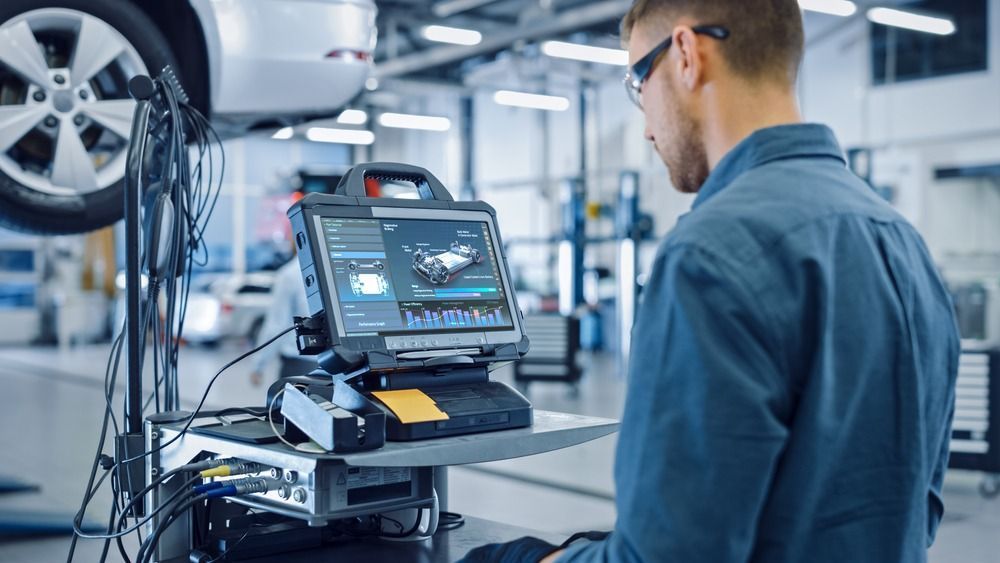Why do I have to pay for a diagnostic?

Imagine your car sputtering and coughing, refusing to cooperate. You take it to the
mechanic, hoping for a swift fix. But before the wrenches fly, you're presented with a bill: the
dreaded diagnostic fee. "Why am I paying for them to just figure out what's wrong?" you
might grumble.
Understanding the reasons behind diagnostic fees requires delving into the intricate process
of automotive diagnosis. It's not just a quick scan and a shrug; it's a blend of skilled labor,
sophisticated equipment, and meticulous detective work. Let's dissect the key factors at
play:
The Detective Work of Diagnosis:
Modern vehicles are marvels of engineering, teeming with complex computer systems and
interconnected components. A seemingly simple symptom like a knocking sound could stem from a myriad of culprits: a worn-out engine mount, a faulty sensor, or even a failing
transmission. Pinpointing the root cause demands a methodical approach:
Communication with the Technician: Communicating with the technician is the
most important step in the diagnosis. Explaining the challenges that you have in
detail could save you money and the technician time on your diagnosis.
Visual Inspection: The technician meticulously examines the vehicle, looking for
telltale signs of wear, leaks, or damage.
Specialized Tools: Specialized tools are required for different diagnostic procedures. It is not as simple as hooking up a scanner and it tells you the answers. There are other specialized tools that may be needed other than a scanner such as smoke detectors, pressure gauges, power probes and so forth. Some of those specialized tools are manufacture specific. Basically, that means that you can only use that tool on that make of cars. Most of the specialized tools can be used on multiple makes and models.
Test Drives and Measurements:
Taking the car for a spin allows the technician to assess performance firsthand, while specialized tests measure things like
compression, fuel pressure, and electrical readings. Every step requires time, expertise, and often, specialized equipment. High-end scanners can cost thousands of dollars and demand ongoing software updates to stay compatible with ever-evolving
vehicle technology.
The Skills of the Automotive Technician:
Diagnosing a car is akin to solving a puzzle, and the technician is the seasoned detective.
Their knowledge and experience play a critical role:
Interpreting Clues: Raw data from scans and tests needs interpretation, and a
seasoned technician can decipher subtle anomalies that point to hidden problems.
Logical Reasoning: The technician must piece together clues from various sources,
logically eliminating possibilities to reach the correct diagnosis.
Troubleshooting Experience:
Years of experience on diverse vehicles allows technicians to draw upon past encounters and apply that knowledge to new challenges. These skills are invaluable, and like any professional expertise, deserve compensation.
The Value of an Accurate Diagnosis:
Skipping proper diagnosis to jump straight to repairs is a gamble. It can lead to:
Misdiagnosis and wasted repairs: Replacing the wrong part not only fails to fix the
problem but also incurs unnecessary expense.
Further damage: An underlying issue left unaddressed can worsen, leading to more
extensive (and expensive) repairs later.
Safety concerns: An undiagnosed problem affecting vital systems like brakes or
steering can compromise safety. An accurate diagnosis ensures targeted repairs, preventing unnecessary costs and potential
safety hazards.
Tradeoffs and Challenges:
The diagnostic process faces inherent tradeoffs and challenges:
Time versus Cost: A thorough diagnosis takes time, which translates to cost for the
customer. Striking a balance between comprehensiveness and affordability is crucial.
Intermittent Issues: Some problems occur sporadically, making them difficult to
diagnose during static testing. Technicians may need to employ creative solutions or
rely on customer input to replicate the issue.
Technological Advancements: As vehicles become increasingly complex,
technicians require ongoing training and investment in updated tools to stay ahead of
the curve. This cost, in turn, may be reflected in diagnostic fees.
Deciding whether to pay a diagnostic fee requires weighing the various factors:
Severity of the problem: Is the car undrivable, or is it a minor inconvenience? A
serious issue warrants a more in-depth diagnosis, even if it comes at a higher cost.
Repair budget: Knowing your budget can help guide your decision. Some shops offer
tiered diagnostic services, catering to different levels of comprehensiveness and cost.
Shop reputation and customer reviews: Research the shop's reputation and what
other customers say about their diagnostic process and charges.
An Informed Decision:
The diagnostic fee isn't just a charge; it's an investment in accurate repairs, peace of mind,
and potentially, your car's safety. By understanding the complex process involved, the value
of skilled technicians, and the tradeoffs at play, you can make an informed decision about
whether a diagnostic fee is worth your money. Remember, a little upfront investment can
save you from bigger headaches (and bills) down the road.
#cardiagnostic #enginediagnostic #diagnosticfee #enginediagnostictool #diagnostictool #cardiagnostictestnearme #cardiagnostictool #bestcardiagnostictool #northlittlerock #northlittlerockarkansas #sherwoodarkansas #littlerock #sylvanhills #cabotarkansas #lrafb





